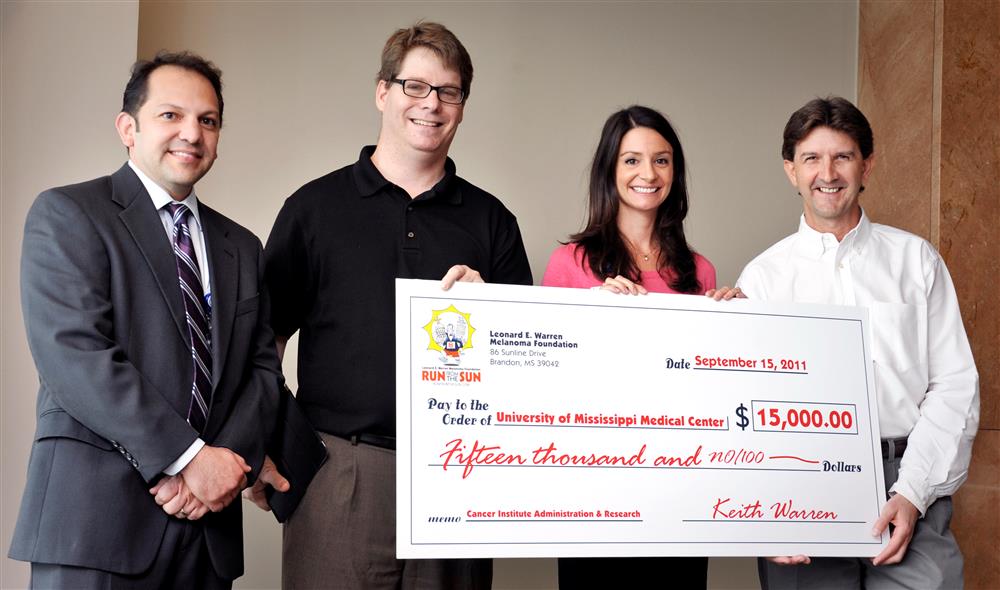With donation from Warren Foundation, UMMC researchers better equipped to study cancer

A $15,000 donation to the University of Mississippi Medical Center's tissue bank by the Leonard E. Warren Melanoma Foundation will support the future of cancer research and other disease investigations in Mississippi and beyond.
With the funding the University Biospecimen Repository bought a minus 80-degree freezer, capable of preserving thousands of samples of tumors, blood-serum and other tissues that investigators can use in research studies, said Dr. Alexandra Shaye Brown, UMMC assistant professor of pathology and repository medical director.
"This donation pays for a freezer - a very specialized one - but it also means so much more to physicians, researchers and cancer survivors," she said.
Medical Center leaders, cancer researchers, surgeons and oncologists convened Thursday on the newly opened seventh floor of the Arthur C. Guyton Research Center, home of UMMC's Cancer Institute. They gathered for a reception to greet and thank Melanoma Foundation officer Keith Warren and co-organizer Marshall Ramsey.
Warren and Ramsey established the foundation in 2003 in memory of Warren's father, a victim of melanoma, the deadliest form of skin cancer. As a melanoma survivor and vocal advocate for screenings and early detection, Ramsey joined the cause. Ramsey is the political cartoonist at the Clarion-Ledger and Keith Warren is the paper's systems editor.
They hold the foundation's main fundraiser, the Run From the Sun, a 5K race in downtown Jackson each April. The event draws thousands of Mississippians and includes free skin-cancer screenings.
At Thursday's gathering that marked the foundation's first donation to UMMC, Warren said he was glad to support the repository.
"After learning about the UMMC Cancer Institute and the tissue bank, it looked like a great organization to support," Warren said.
Ramsey said raising money through the foundation and donating to the tissue bank is a lemons-to-lemonade story of taking negative experiences with cancer and turning them into community events to fight the disease.
The road to a functioning tissue bank at UMMC goes back several years.
Brown completed her pathology residency at UMMC in 2006, moved to Houston for a fellowship at the University of Texas MD Anderson Cancer Center before returning to the Magnolia state in 2008 to join the School of Medicine faculty. While involved in breast cancer research in Texas she realized there was a gaping hole in many studies - a huge lack of samples from African-American females.
Brown knew Mississippi had plenty of patients who, with the proper consent and collection framework, could ease that disparity.
"Prior to our tissue bank, most tumors removed at UMMC were incinerated as medical waste," she said. "We weren't banking in Mississippi because we didn't have the infrastructure."
That infrastructure includes specialized freezers, such as the one the Warren Foundation's donation purchased, as well as computers and software programs to catalog and track each specimen, centrifuges, dissection machinery and disposable laboratory materials like gloves and pipettes.
Funding and support for the 3-year-old repository has come from multiple sources. Dr. Steven Bigler, chair of pathology, gave space in his department for the repository. Cancer Institute Director Dr. Lucio Miele funded two researcher positions for the bank, and Dr. Scott Stringer, chair of Otolaryngology and Communicative Sciences, donated the repository's first freezer from his department.
As the repository's collection grows, researchers from UMMC and medical centers nationwide will be able to mine the repository's computer system to tailor groups of, say, triple-negative specimens from women ages 45-55 whose tumors metastasized but who are now in cancer remission. Or a sampling of men in their 70s who had pre-cancerous intestinal polyps removed.
The larger the repository's collection, the broader its applications, said Jesus Monico, a cancer researcher at UMMC and the repository's administrative director.
"When our software system is fully implemented, we'll be able to grab all these data points about each specimen," Monico said. "Researchers will be able to know all kinds of information - when the tumor was resected, how long until it was frozen, what its hormone-receptor status was, how it was treated medically, how big it was and if the patient is still alive."
With more detailed records, scientists can design study proposals with greater accuracy. And the more likely those proposals will be to win funding from federal institutes, non-profit associations and pharmaceutical companies.
With the increased freezer space from the Warren Foundation's donation Brown and Monico said they will be able to start collecting pediatric, gastro-intestinal, lung and colon tumors.
"And it's not just cancer, we'll be collecting other samples pertinent to biomedical research," Monico said.
They've contracted with specialists from Vanderbilt University's tissue bank to help with software implementation and they plan to seek national certification for the repository. That label will prove the bank meets standardized criteria and is a reliable and credible source.
"We want to build this right," Brown said. "We're so grateful to Keith and Marshall for their support and we're determined to make this a top-notch scientific resource."
More information about the University Biospecimen Repository is available by contacting Dr. Alexandra Shaye Brown at ashaye@umc.edu.
More information on the Leonard E. Warren Melanoma Foundation and the Run From the Sun can be found at www.runfromthesun.com.


